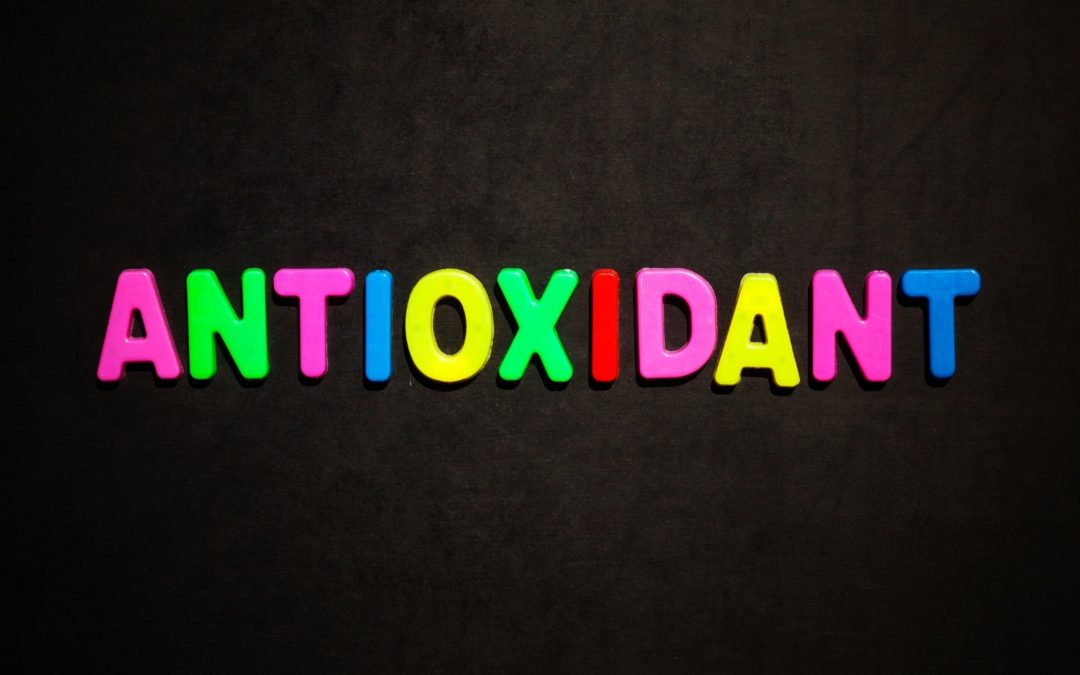
by Tomato Wellness | Oct 15, 2021 | Food and Nutrition
Antioxidants are powerful protective nutrients that can be found in certain foods, such as canned tomatoes. Disease prevention and improved health are only some of the many benefits, so keep reading to learn more about how you can prevent chronic disease with antioxidants.
Over the past 30 years, there has been an increasing amount of research with the correlation between nutrition and chronic disease prevention. Some of the most prominent health problems are cardiovascular disease and stomach, colon, breast, prostate, ovary, and endometrium cancer, but studies have shown certain foods (such as fruits, vegetables, and tea) have the capability to halt the development of these diseases [1].
Even though we all know that fruits and vegetables can boost your health, how can they prevent chronic disease? The answer lays in their antioxidant content. When cardiovascular disease and cancer take form in the body, abnormal oxidative processes take place, which lead to the formation of hydroxy radicals and peroxy compounds [1]. Antioxidants are important to prevent these diseases because they can work against oxidative processes and delay the onset of disease [1]. Some produce items that are rich in antioxidants include: broccoli, spinach, carrots, potatoes, artichokes, cabbage, asparagus, avocados, beetroot, radish, lettuce, sweet potatoes, squash, pumpkin, collard greens and kale.
Lycopene is another antioxidant that is found abundantly in canned tomatoes. Heating tomatoes during the cooking process increases the body’s ability to absorb lycopene, which in turn makes them even more powerful at protecting against disease. Lycopene also plays an integral role in the improvement of heart health, protection from the sun, and reduction in certain types of cancer [1].
If you want to better your health and prevent chronic disease, give canned tomato products a try. So, the next time you are in the grocery store, pick up a few cans of tomatoes and try out some new recipes! Your body will thank you for it.
Check out some delicious recipes featuring canned tomatoes:
Pan Seared Pork Chops with Bourbon Peach Compote
Easy Chicken Curry
Pizza Stuffed Chicken
The BEST BLT Dip
- Weisburger, J. H. (1998). Evaluation of the evidence on the role of Tomato Products in disease prevention.Experimental Biology and Medicine,218(2), 140–143. https://doi.org/10.3181/00379727-218-44281

by Tomato Wellness | Oct 10, 2021 | Food and Nutrition
Have you ever wondered why canned tomatoes are so popular? Not only are they delicious, but it’s also a great way to reduce your risk of cancer. From affordability to versatility, learn more about why tomatoes are the #1 canned food in America!
Did you know that tomatoes are the most frequently consumed canned vegetable, and fourth most frequently consumed fresh vegetable in the USA? [1] There are many reasons why canned tomatoes are so popular, as they are affordable, delicious, shelf stable, and extremely versatile! Additionally, they pack a powerful nutrition punch when compared to than their fresh counterparts, as studies have shown that canned tomatoes can reduce the risk of certain cancers and cardiovascular disease (CVD).
There is emerging research showing the connection between tomato consumption and reduced risk for cardiovascular diseases and prostate cancer [1]. Prostate cancer is the most newly frequently diagnosed cancer and is the leading cause of cancer death in men. According to the American Cancer Society, there are nearly 250,000 new cases of prostate cancer in the U.S. each year, resulting in more than 34,000 deaths [1]. A body of evidence supporting the benefits of tomatoes for reducing the risk of prostate cancer has mounted over the past several years, and research shows the promise of tomato consumption on prostate cancer protection.
Cardiovascular disease is the number one cause of death in the USA, with over 70 million Americans having some form of it [1]. While more research is needed to determine the exact mechanisms in which a healthy diet delays the onset of CVD and prostate cancer, there is promising evidence supporting a diet rich in antioxidants (specifically from canned tomatoes) [1]. This could be due to the bioactive compounds found in tomatoes, as they activate the health benefits associated with these products, and result in an advantageous outcome on platelet aggregation. Recent research shows that tomato products play an important role in preventing platelet aggregation (i.e. reducing the amount of blood clots that can lead to cardiovascular diseases).
Making healthy meals doesn’t have to be time consuming or complicated. That’s why canned tomatoes are the #1 canned food in America, as you can use them to get dinner on the table in no time…all while boosting your health and saving money! No matter what type of cuisine you enjoy, you can incorporate canned tomatoes into almost any dish for added flavor and health.
1.Canene-Adams, K., Campbell, J. K., Zaripheh, S., Jeffery, E. H., & Erdman, J. W. (2005). The Tomato as a functional food. The Journal of Nutrition, 135(5), 1226–1230. https://doi.org/10.1093/jn/135.5.1226

by Tomato Wellness | Oct 5, 2021 | News
Aging causes a decrease in cognitive decline, but you may be able to stave off the effects based on what you eat. A decline in cognitive function (such as Alzheimer’s disease) may be prevented through good nutrition, so read on to learn more about how canned tomatoes play a role in brain health.
It’s no secret that with aging comes a decrease in cognitive function. Alzheimer’s disease is one of the leading causes of dementia, and comes loss of memory, language, problem-solving and other skills related to critical thinking [1]. However, did you know that it is possible to prevent cognitive decline with a healthy diet?
Without protection, the aging process can bring on free radicals and inflammation that wreak havoc and can even lead to diseases such as dementia [1]. However, certain properties within food can provide a protective effect to our cells, as antioxidant phytochemicals can remove free radicals and reduce inflammation within the body. One of these powerful antioxidants is lycopene, which is found in tomatoes. Studies have shown that low levels of lycopene within the body can leave you at a greater risk for disease, which is why eating foods rich in this antioxidant is beneficial for health. Researchers are also currently studying the specific effects that lycopene has on cognitive function, as there have been associations between lower circulating lycopene and higher rates of Alzheimer’s disease mortality [1].
While lycopene can be found in any type of tomato, it is particularly concentrated in canned tomato products. When tomatoes go through the canning process, they are heated, which increases the body’s ability to absorb lycopene.
Including canned tomatoes in your weekly recipes is a great way to promote good healthy and protect your body from signs of aging. So, what are you waiting for? Enjoy all the flavors and health benefits that canned tomatoes have to offer by trying some delicious new recipes.
Check out some delicious recipes featuring canned tomatoes:
Pan Seared Pork Chops with Bourbon Peach Compote
Easy Chicken Curry
Pizza Stuffed Chicken
The BEST BLT Dip
- Crowe-White, K. M., Phillips, T. A., & Ellis, A. C. (2019). Lycopene and cognitive function.Journal of Nutritional Science, 8. https://doi.org/10.1017/jns.2019.16

by Tomato Wellness | Sep 22, 2021 | News
Lycopene rich foods may have the ability to prevent central nervous system disease. This carotenoid found in tomato products may be the secret to preventing disease like Alzheimer’s and dementia. Learn more about what science has to say about lycopene rich foods and preventing disease.
It has been proven many times that lycopene (a carotenoid found in tomatoes) is an amazing antioxidant and anti-inflammatory agent that can help to reduce disease such as heart disease, fatty liver disease, prostate disease, and type 2 diabetes. However, it is lesser known that lycopene may also have neuroprotective effects in the central nervous system [1].
Studies have found that lycopene can reduce oxidative stress, neuroinflammation, neural apoptosis, and to restore function of the mitochondria. Lycopene has shown that is has neuroprotective effects, and while evidence has found lycopene supplementation can improve cognitive performance, further research may be able to prove the positive effects on the central nervous system [1]. This would allow lycopene and foods that contain lycopene to be used to prevent or treat disorders of the central nervous system. However, one drawback to using foods that contain lycopene to treat these diseases and disorders is the low bioavailability of lycopene. In some foods it may be too low to raise the level within brain tissue. However, higher concentrations of lycopene (like in a supplement) have been shown to have toxic effects [1].
Canned tomato products could possibly play a role in the treatment of central nervous system diseases and disorders. While some foods may not contain adequate levels of lycopene and would not be effective as a treatment, canned tomatoes have increased bioavailability of lycopene due to heating during processing. While further studies need to be done to prove that canned tomato products could be used in this way, it is a possibility. At the very least, we know that canned tomato products are an excellent addition to the diet and have already been proven to prevent many other diseases.
Learn more about the benefits of lycopene with these resources:
Lycopene and Canned Tomatoes May Help with Cancer Prevention
Health Connection Between Tomatoes and Lycopene
What is Lycopene?
References:
- Chen, D., Huang, C., & Chen, Z. (2019). A review for the pharmacological effect of lycopene in central nervous system disorders.Biomedicine & Pharmacotherapy,111, 791–801. https://doi.org/10.1016/j.biopha.2018.12.151

by Tomato Wellness | Sep 15, 2021 | News
It is no secret that a diet high in saturated fats can lead to high cholesterol levels, hyperlipidemia, and even heart disease. But is drinking tomato juice worth a try for your health? Read on to learn about the effects of tomato juice on hyperlipidemia.
Cardiovascular disease is one of the most prevalent diseases that affects Americans each year. One of the driving factors for this is a diet high in saturated fats and highly processed carbohydrates, which is why eating a diet rich in phytonutrients can help fight against disease.
One of the richest sources of phytonutrients are canned tomato products. Due to the heating that is done during processing, lycopene is much more bioavailable [1]. While some vegetables lose nutrients during processing, tomatoes become more nutrient rich.
With so many nutritional benefits and cancer-fighting properties, researchers are continually finding ways that canned tomatoes can fight heart disease. One recent study tested the effects of tomato juice on high levels of fats in the blood (hyperlipidemia) with hamsters. The study was conducted in this manner because hamsters process cholesterol and respond to a high fat diet in a similar way to humans [1]. With this study, these small rodents were fed a diet high in cholesterol to induce hyperlipidemia. After eating the high cholesterol diet, the hamsters had significantly high levels of total cholesterol, triacylglycerol, high-density lipoprotein cholesterol, low-density lipoprotein cholesterol, and LDL/HDL ratio [1]. They were then fed tomato juice to examine if this had a reversed effect. After six weeks of consuming tomato juice, the hamsters had lowered levels of serum cholesterol and they excreted more fat in their feces. These results show that tomato juice supplementation may be a possible option for lowering blood lipid levels and reduce the effects of high blood lipids in humans [1].
If you are not a fan of drinking plain tomato juice, go ahead and get creative in the kitchen! You can blend it into your daily smoothie, add it to gazpacho, or throw it into a pot of meatballs that are simmering in sauce.
References:
- Lee, L.-C., Wei, L., Huang, W.-C., Hsu, Y.-J., Chen, Y.-M., & Huang, C.-C. (2015). Hypolipidemic effect of tomato juice in hamsters in high cholesterol diet-induced hyperlipidemia.Nutrients,7(12), 10525–10537. https://doi.org/10.3390/nu7125552





Recent Comments